IET Information Security, vol. 13, issue 5, IET, pp. 498 -- 507, 09/2019.
Abstract
Escrowed decryption schemes (EDSs) are public-key encryption schemes with an escrowed decryption functionality that allows authorities to decrypt encrypted messages under investigation, following a protocol that involves a set of trusted entities called `custodians'; only if custodians collaborate, the requesting authority is capable of decrypting encrypted data. This type of cryptosystem represents an interesting trade-off to privacy versus surveillance dichotomy. In this study, the authors propose two EDSs where they use proxy re-encryption to build the escrowed decryption capability, so that custodians re-encrypt ciphertexts, in a distributed way, upon request from an escrow authority, and the re-encrypted ciphertexts can be opened only by the escrow authority. Their first scheme, called EDS, follows an all-or-nothing approach, which means that escrow decryption only works when all custodians collaborate. Their second scheme, called threshold EDS, supports a threshold number of custodians for the escrow decryption operation. They propose definitions of semantic security with respect to the authorities, custodians and external entities, and prove the security of their schemes, under standard pairing-based hardness assumptions. Finally, they present a theoretical and experimental analysis of the performance of both schemes, which show that they are applicable to real-world scenarios.
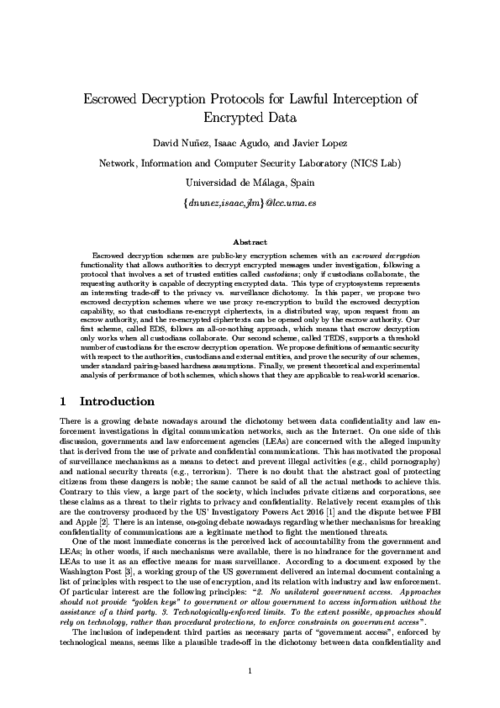
Blockchain Protocol Analysis and Security Engineering 2018, 01/2018.
31st Annual IFIP WG 11.3 Conference on Data and Applications Security and Privacy (DBSec'17), vol. LNCS 10359, Springer, pp. 453-472, 07/2017. DOI
Abstract
In this paper, we analyze how key compromise affects the protocol by Nguyen et al. presented at ESORICS 2016, an authenticated key agreement protocol mediated by a proxy entity, restricted to only symmetric encryption primitives and intended for IoT environments. This protocol uses long-term encryption tokens as intermediate values during encryption and decryption procedures, which implies that these can be used to encrypt and decrypt messages without knowing the cor- responding secret keys. In our work, we show how key compromise (or even compromise of encryption tokens) allows to break forward secu- rity and leads to key compromise impersonation attacks. Moreover, we demonstrate that these problems cannot be solved even if the affected user revokes his compromised secret key and updates it to a new one. The conclusion is that this protocol cannot be used in IoT environments, where key compromise is a realistic risk.
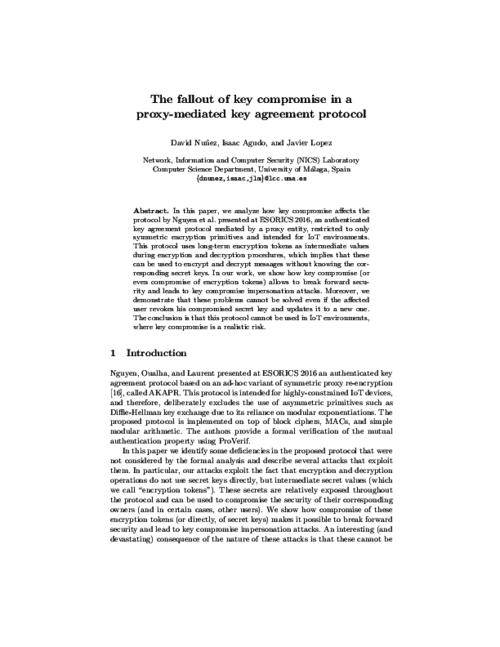
Journal of Network and Computer Applications, vol. 87, Elsevier, pp. 193-209, 06/2017. DOI
Abstract
This paper analyzes the secure access delegation problem, which occurs naturally in the cloud, and postulate that Proxy Re-Encryption is a feasible cryptographic solution, both from the functional and efficiency perspectives. Proxy re-encryption is a special type of public-key encryption that permits a proxy to transform ciphertexts from one public key to another, without the proxy being able to learn any information about the original message. Thus, it serves as a means for delegating decryption rights, opening up many possible applications that require of delegated access to encrypted data. In particular, sharing information in the cloud is a prime example. In this paper, we review the main proxy re-encryption schemes so far, and provide a detailed analysis of their characteristics. Additionally, we also study the efficiency of selected schemes, both theoretically and empirically, based on our own implementation. Finally, we discuss some applications of proxy re-encryption, with a focus on secure access delegation in the cloud.
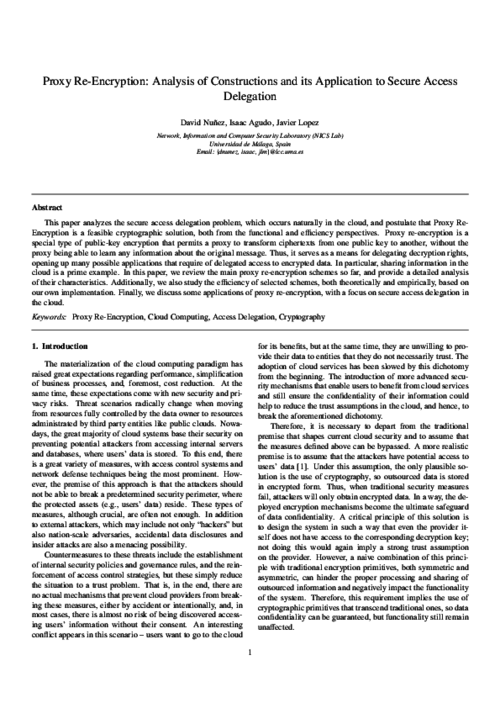
32nd International Conference on ICT Systems Security and Privacy Protection (IFIP SEC 2017), S. De Capitan di Vimercati, and F. Martinelli Eds., IFIP Advances in Information and Communication Technology (AICT) 502, Springer, pp. 141–154, 05/2017. DOI
Abstract
The Internet of Things (IoT) promises to revolutionize the way we interact with the physical world. Even though this paradigm is still far from being completely realized, there already exist Sensing-as-a-Service (S2aaS) platforms that allow users to query for IoT data. While this model offers tremendous benefits, it also entails increasingly challenging privacy issues. In this paper, we concentrate on the protection of user privacy when querying sensing devices through a semi-trusted S2aaS platform. In particular, we build on techniques inspired by proxy re-encryption and k-anonymity to tackle two intertwined problems, namely query privacy and query confidentiality. The feasibility of our solution is validated both analytically and empirically.
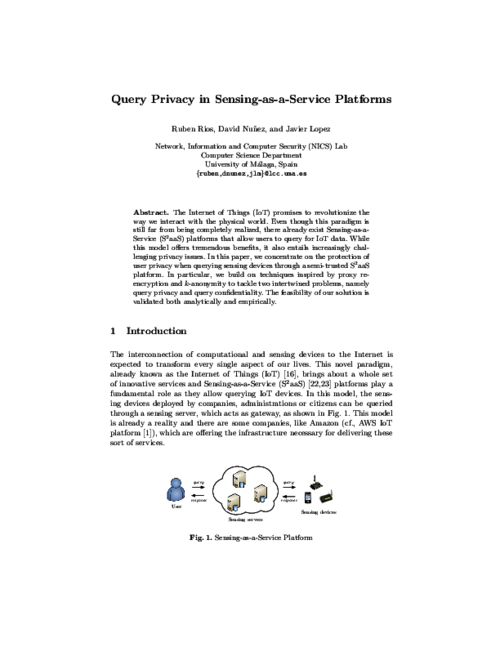
III Jornadas Nacionales de Investigación en Ciberseguridad, URJC, pp. 174-175, 06/2017.
Abstract
En este artículo presentamos un sistema que permite delegación de acceso a información cifrada para Apache Hadoop, de forma segura y transparente al usuario. Para ello usamos técnicas criptográficas avanzadas basadas en el recifrado delegado. Con este sistema, es posible almacenar en Hadoop los datos de forma cifrada y delegar de forma segura el acceso a los nodos de computación. El funcionamiento es transparente ya que se integra con la capa del sistema de ficheros nativa HDFS. Además, el recifrado delegado permite hacer rotación de claves de cifrado de forma segura y rápida.
Security and Communication Networks, vol. 9, issue 12, Wiley, pp. 1769-1785, 08/2016. DOI
Abstract
Several generic methods exist for achieving chosen-ciphertext attack (CCA)-secure public-key encryption schemes from weakly secure cryptosystems, such as the Fujisaki–Okamoto and REACT transformations. In the context of proxy re-encryption (PRE), it would be desirable to count on analogous constructions that allow PRE schemes to achieve better security notions. In this paper, we study the adaptation of these transformations to proxy re-encryption and find both negative and positive results. On the one hand, we show why it is not possible to directly integrate these transformations with weakly secure PRE schemes because of general obstacles coming from both the constructions themselves and the security models, and we identify 12 PRE schemes that exhibit these problems. On the other hand, we propose an extension of the Fujisaki–Okamoto transformation for PRE, which achieves a weak form of CCA security in the random oracle model, and we describe the sufficient conditions for applying it
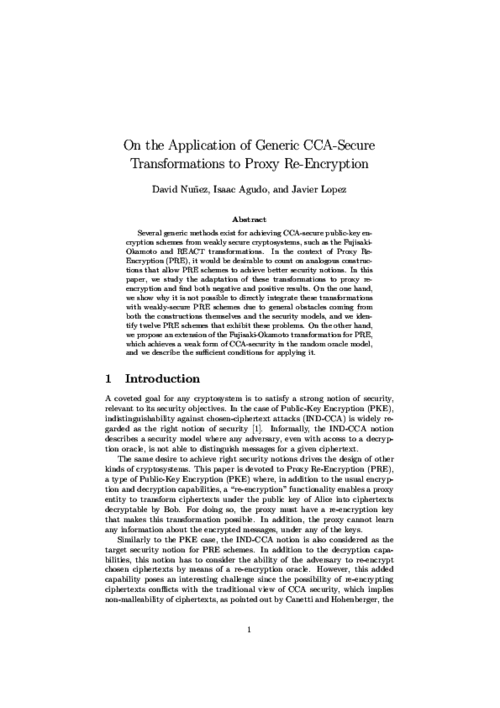
Computers & Security, vol. 62, Elsevier, pp. 149-164, 08/2016. DOI
Abstract
Cloud computing provides enormous business opportunities, but at the same time is a complex and challenging paradigm. The major concerns for users adopting the cloud are the loss of control over their data and the lack of transparency. Providing accountability to cloud systems could foster trust in the cloud and contribute toward its adoption. Assessing how accountable a cloud provider is becomes then a key issue, not only for demonstrating accountability, but to build it. To this end, we need techniques to measure the factors that influence on accountability. In this paper, we provide a methodology to elicit metrics for accountability in the cloud, which consists of three different stages. Since the nature of accountability at- tributes is very abstract and complex, in the first stage we perform a conceptual analysis of the accountability attributes in order to decompose them into concrete practices and mechanisms. Then, we analyze relevant control frameworks designed to guide the implementation of security and privacy mechanisms, and use them to identify measurable factors, related to the practices and mechanisms defined earlier. Lastly, specific metrics for these factors are derived. We also provide some strategies that we consider relevant for the empirical validation of the elicited accountability metrics.
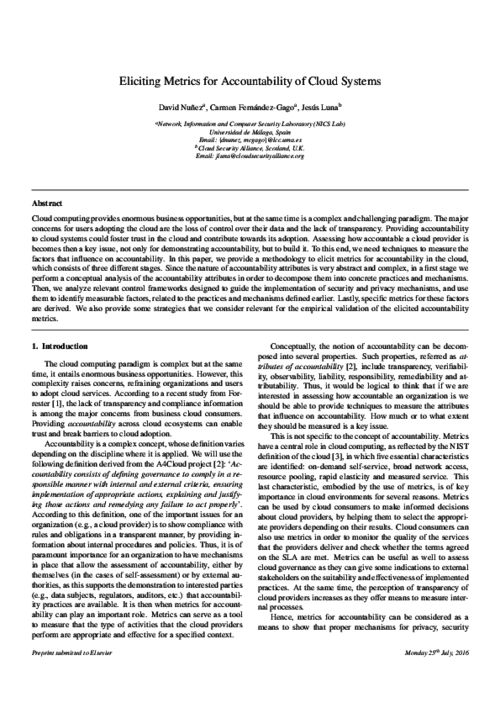
XIV Reunión Española sobre Criptología y Seguridad de la Información, pp. 174-179, 10/2016.
Abstract
El recifrado delegado (proxy re-encryption) es un tipo de cifrado de clave pública que permite delegar la capacidad de transformar textos cifrados de una clave pública a otra, sin que se pueda obtener ninguna información sobre el mensaje subyacente. Por este motivo, representa un candidato natural para construir mecanismos criptográficos de control de acceso. En este artículo estudiamos algunos de los problemas de seguridad de este tipo de criptosistemas. En primer lugar, examinamos las nociones de seguridad e identificamos una nueva familia paramétrica de modelos de ataque, que considera la disponibilidad tanto del oráculo de descifrado como de recifrado. En segundo lugar, estudiamos la aplicabilidad de transformaciones genéricas para mejorar la seguridad, centrándonos en la transformación Fujisaki-Okamoto, y formulamos las condiciones que nos permiten aplicarla.
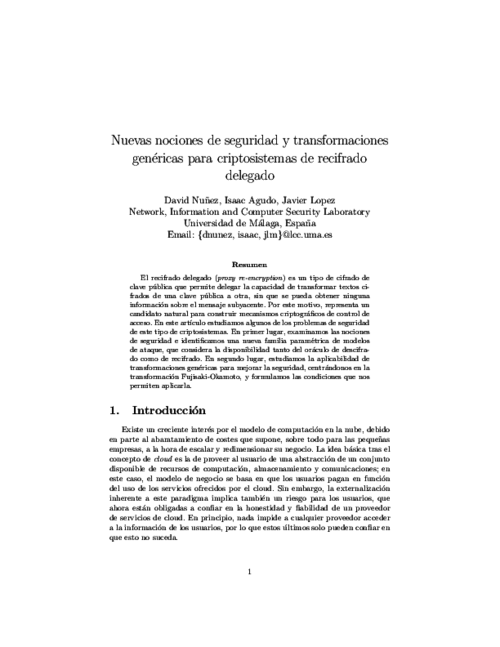
10th International IFIP Summer School on Privacy and Identity Management, pp. 187-204, 2016. DOI
Abstract
Transparency and verifiability are necessary aspects of accountability, but care needs to be taken that auditing is done in a privacy friendly way. There are situations where it would be useful for certain actors to be able to make restricted views within service provision chains on accountability evidence, including logs, available to other actors with specific governance roles. For example, a data subject or a Data Protection Authority (DPA) might want to authorize an accountability agent to act on their behalf, and be given access to certain logs in a way that does not compromise the privacy of other actors or the security of involved data processors. In this paper two cryptographic-based techniques that may address this issue are proposed and assessed.
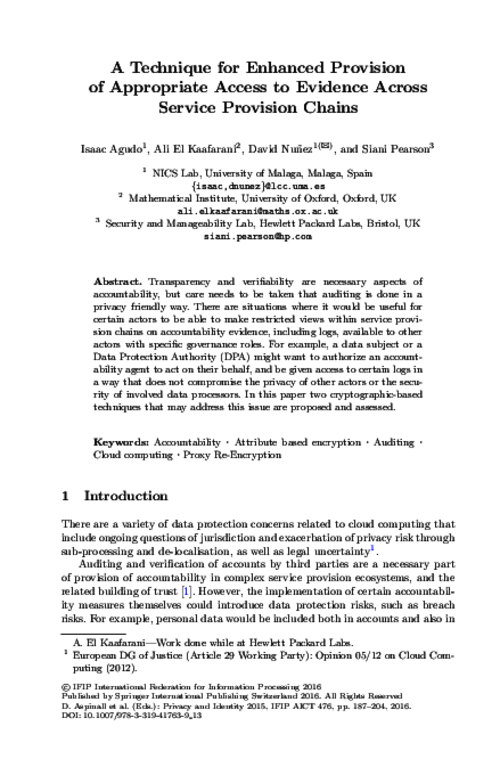
Accountability and Security in the Cloud, vol. 8937, no. LNCS Tutorial, pp. 129-153, 2015.
10th ACM Symposium on Information, Computer and Communications Security (AsiaCCS), pp. 179-189, 04/2015. DOI
Abstract
The use of alternative foundations for constructing more secure and efficient cryptographic schemes is a topic worth exploring. In the case of proxy re-encryption, the vast majority of schemes are based on number theoretic problems such as the discrete logarithm. In this paper we present NTRUReEncrypt, a new bidirectional and multihop proxy re-encryption scheme based on NTRU, a widely known lattice-based cryptosystem. We provide two versions of our scheme: the first one is based on the conventional NTRU encryption scheme and, although it lacks a security proof, remains as efficient as its predecessor; the second one is based on a variant of NTRU proposed by Stehlé and Steinfeld, which is proven CPA-secure under the hardness of the Ring-LWE problem. To the best of our knowledge, our proposals are the first proxy re-encryption schemes to be based on the NTRU primitive. In addition, we provide experimental results to show the efficiency of our proposal, as well as a comparison with previous proxy re-encryption schemes, which confirms that our first scheme outperforms the rest by an order of magnitude.
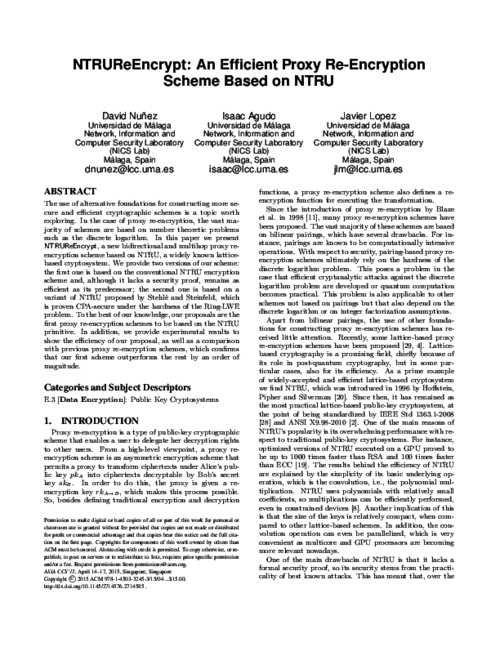
28th IEEE Computer Security Foundations Symposium, IEEE Computer Society, pp. 290-301, 07/2015. DOI
Abstract
Proxy Re-Encryption (PRE) is a type of Public-Key Encryption (PKE) which provides an additional re-encryption functionality. Although PRE is inherently more complex than PKE, attack models for PRE have not been developed further than those inherited from PKE. In this paper we address this gap and define a parametric family of attack models for PRE, based on the availability of both the decryption and re-encryption oracles during the security game. This family enables the definition of a set of intermediate security notions for PRE that ranges from ``plain'' IND-CPA to ``full'' IND-CCA. We analyze some relations among these notions of security, and in particular, the separations that arise when the re-encryption oracle leaks re-encryption keys. In addition, we discuss which of these security notions represent meaningful adversarial models for PRE. Finally, we provide an example of a recent ``CCA1- secure'' scheme from PKC 2014 whose security model does not capture chosen-ciphertext attacks through re-encryption and for which we describe an attack under a more realistic security notion. This attack emphasizes the fact that PRE schemes that leak re-encryption keys cannot achieve strong security notions.
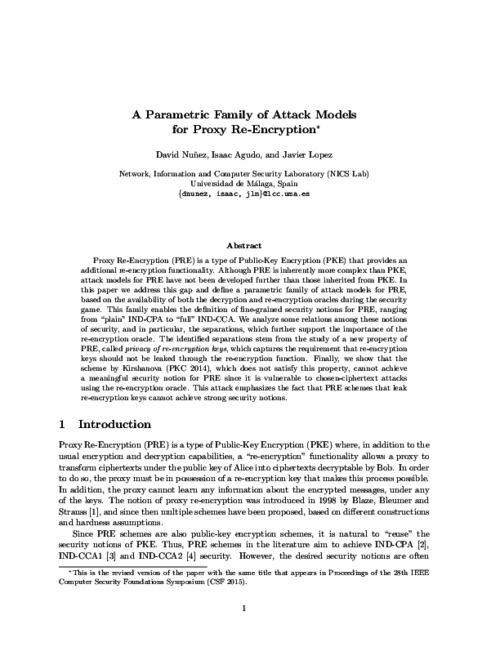
Accountability and Security in the Cloud, M. Felici, and C. Fernandez-Gago Eds., Lecture Notes in Computer Science 8937, Springer International Publishing, pp. 114-125, 2015. DOI
Abstract
In this paper we tackle the problem of privacy and confidentiality in Identity Management as a Service (IDaaS). The adoption of cloud computing technologies by organizations has fostered the externalization of the identity management processes, shaping the concept of Identity Management as a Service. However, as it has happened to other cloud-based services, the cloud poses serious risks to the users, since they lose the control over their data. As part of this work, we analyze these concerns and present a model for privacy-preserving IDaaS, called BlindIdM, which is designed to provide data privacy protection through the use of cryptographic safeguards.
9th IFIP Summer School on Privacy and Identity Management for the Future Internet in the Age of Globalisation, vol. 457, Springer IFIP AICT, pp. 219-236, 2015. DOI
Abstract
Cloud computing is becoming a key IT infrastructure technology being adopted progressively by companies and users. Still, there are issues and uncertainties surrounding its adoption, such as security and how users data is dealt with that require attention from developers, researchers, providers and users. The A4Cloud project tries to help solving the problem of accountability in the cloud by providing tools that support the process of achieving accountability. This paper presents the contents of the first A4Cloud tutorial. These contents include basic concepts and tools developed within the project. In particular, we will review how metrics can aid the accountability process and some of the tools that the A4Cloud project will produce such as the Data Track Tool (DTT) and the Cloud Offering Advisory Tool (COAT).

International Journal of Information Security, vol. 13, issue 2, Springer, pp. 199-215, 2014. DOI
Abstract
Identity management is an almost indispensable component of today’s organizations and companies, as it plays a key role in authentication and access control; however, at the same time it is widely recognized as a costly and time-consuming task. The advent of cloud computing technologies, together with the promise of flexible, cheap and efficient provision of services, has provided the opportunity to externalize such a common process, shaping what has been called Identity Management as a Service (IDaaS). Nevertheless, as in the case of other cloud-based services, IDaaS brings with it great concerns regarding security and privacy, such as the loss of control over the outsourced data. In this paper we analyze these concerns and propose BlindIdM, a model for privacy-preserving IDaaS with a focus on data privacy protection. In particular, we describe how a SAML-based system can be augmented to employ proxy re-encryption techniques for achieving data condentiality with respect to the cloud provider, while preserving the ability to supply the identity service. This is an innovative contribution to both the privacy and identity management landscapes.
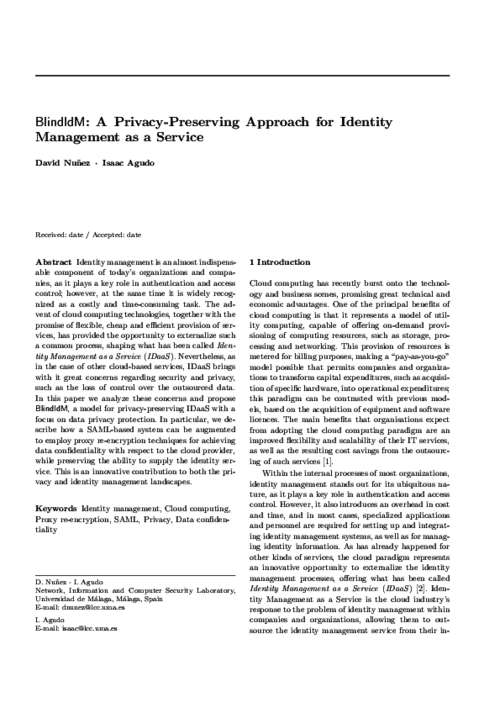
IEEE International Conference on Cloud Computing Technology and Science (CloudCom 2014), IEEE, pp. 374-379, 12/2014. DOI
Abstract
Among Big Data technologies, Hadoop stands out for its capacity to store and process large-scale datasets. However, although Hadoop was not designed with security in mind, it is widely used by plenty of organizations, some of which have strong data protection requirements. Traditional access control solutions are not enough, and cryptographic solutions must be put in place to protect sensitive information. In this paper, we describe a cryptographically-enforced access control system for Hadoop, based on proxy re-encryption. Our proposed solution fits in well with the outsourcing of Big Data processing to the cloud, since information can be stored in encrypted form in external servers in the cloud and processed only if access has been delegated. Experimental results show that the overhead produced by our solution is manageable, which makes it suitable for some applications.
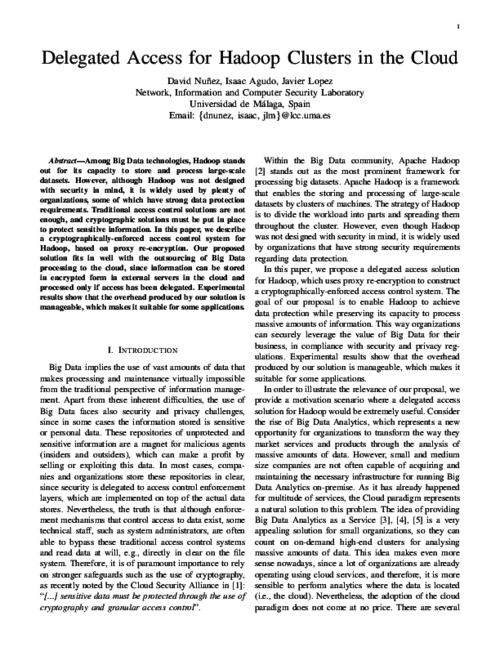
Ph.D Symposium of the European Conference on Service-Oriented and Cloud Computing (ESOCC) 2013, September 2013.
Abstract
The advent of cloud computing has provided the opportunity to externalize the identity management processes, shaping what has been called Identity Management as a Service (IDaaS). However, as in the case of other cloud-based services, IDaaS brings with it great concerns regarding security and privacy, such as the loss of control over the outsourced data. As part of this PhD thesis, we analyze these concerns and propose BlindIdM, a model for privacy-preserving IDaaS with a focus on data privacy protection through the use of proxy re-encryption.
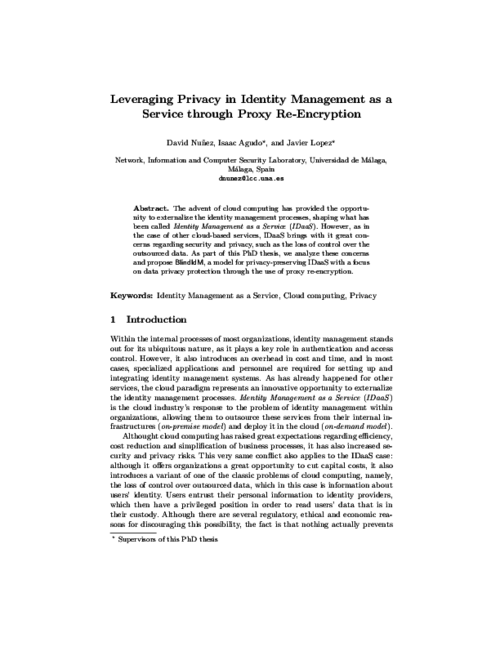
2013 IEEE International Conference on Cloud Computing Technology and Science (CloudCom 2013), IEEE, pp. 355-362, 12/2013. DOI
Abstract
Cloud governance, and in particular data governance in the cloud, relies on different technical and organizational practices and procedures, such as policy enforcement, risk management, incident management and remediation. The concept of accountability encompasses such practices, and is essential for enhancing security and trustworthiness in the cloud. Besides this, proper measurement of cloud services, both at a technical and governance level, is a distinctive aspect of the cloud computing model. Hence, a natural problem that arises is how to measure the impact on accountability of the procedures held in practice by organizations that participate in the cloud ecosystem. In this paper, we describe a metamodel for addressing the problem of measuring accountability properties for cloud computing, as discussed and defined by the Cloud Accountability Project (A4Cloud). The goal of this metamodel is to act as a language for describing: (i) accountability properties in terms of actions between entities, and (ii) metrics for measuring the fulfillment of such properties. It also allows the recursive decomposition of properties and metrics, from a high-level and abstract world to a tangible and measurable one. Finally, we illustrate our proposal of the metamodel by modelling the transparency property, and define some metrics for it.
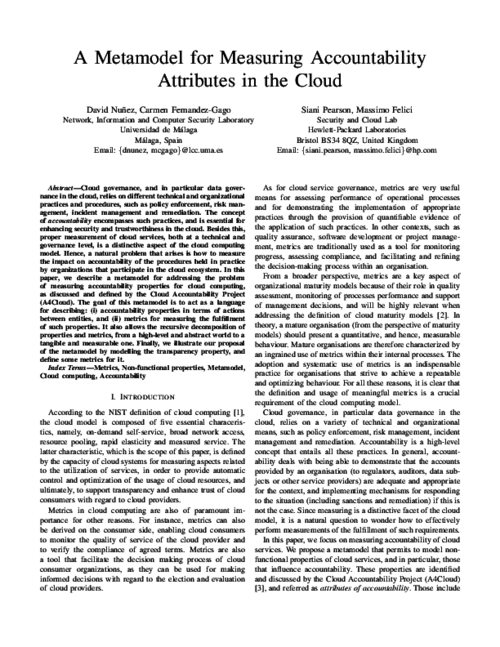
IEEE CloudCom 2012, IEEE Computer Society, pp. 241 - 248, Dec 2012. DOI
Abstract
The inclusion of identity management in the cloud computing landscape represents a new business opportunity for providing what has been called Identity Management as a Service (IDaaS). Nevertheless, IDaaS introduces the same kind of problems regarding privacy and data confidentiality as other cloud services; on top of that, the nature of the outsourced information (users’ identity) is critical. Traditionally, cloud services (including IDaaS) rely only on SLAs and security policies to protect the data, but these measures have proven insufficient in some cases; recent research has employed advanced cryptographic mechanisms as an additional safeguard. Apart from this, there are several identity management schemes that could be used for realizing IDaaS systems in the cloud; among them, OpenID has gained crescent popularity because of its open and decentralized nature, which makes it a prime candidate for this task. In this paper we demonstrate how a privacy-preserving IDaaS system can be implemented using OpenID Attribute Exchange and a proxy re-encryption scheme. Our prototype enables an identity provider to serve attributes to other parties without being able to read their values. This proposal constitutes a novel contribution to both privacy and identity management fields. Finally, we discuss the performance and economical viability of our proposal.
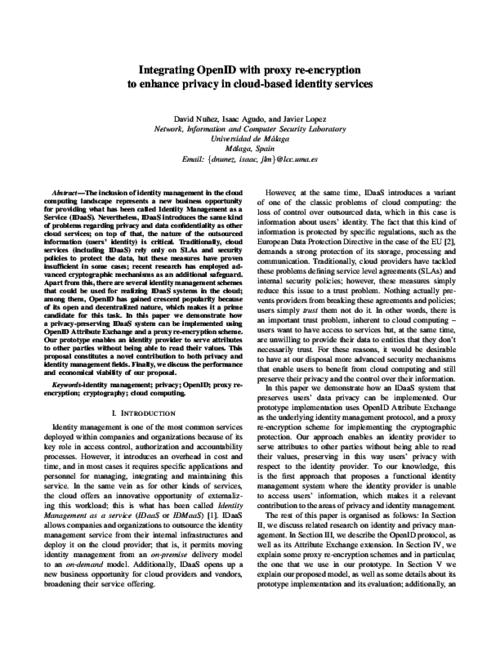
Information Security Solutions Europe 2012, N. Pohlmann, H. Reimer, and W. Schneider Eds., Springer Vieweg, pp. 195-206, 2012. DOI
Abstract
The paper describes the experience with integration of automatic cyber identity technology with policy controlled virtualisation environment. One identity technology has been used to enable strong authentication of users (human beings) as well as machines (host systems) to the virtualization management system. The real experimental evaluation has been done in PASSIVE project (Policy-Assessed system-level Security of Sensitive Information processing in Virtualised Environments - SEVENTH FRAMEWORK PROGRAMME THEME ICT-2009.1.4 INFORMATION AND COMMUNICATION TECHNOLOGIES - Small or medium-scale focused research project - Grant agreement no.: 257644).
1st International Workshop on Security and Trust for Applications in Virtualised Environments (STAVE 2011), C. Lee, J-M. Seigneur, J. J. Park, and R. R. Wagner Eds., Communications in Computer and Information Science 187, Springer, pp. 190-197, June, 2011. DOI
Abstract
In this paper we identify some areas where cryptography can help a rapid adoption of cloud computing. Although secure storage has already captured the attention of many cloud providers, offering a higher level of protection for their customer’s data, we think that more advanced techniques such as searchable encryption and secure outsourced computation will become popular in the near future, opening the doors of the Cloud to customers with higher security requirements.
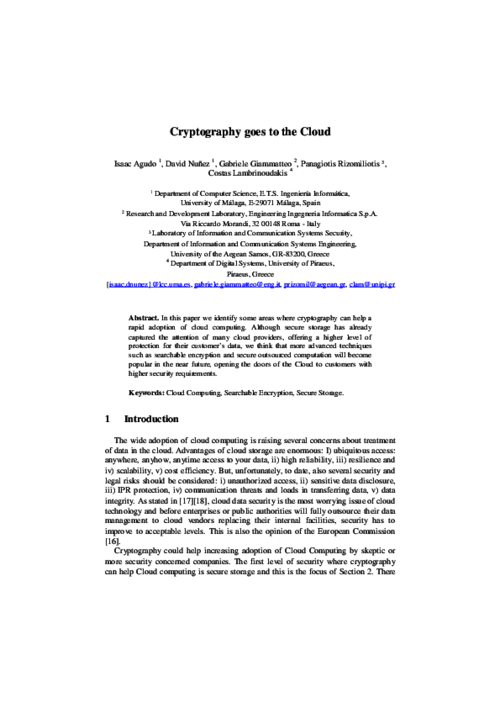
1st International Workshop on Security and Trust for Applications in Virtualised Environments (STAVE 2011), vol. 187, pp. 198-204, June, 2011. DOI
Abstract
Intercloud notion is gaining a lot of attention lately from both enterprise and academia, not only because of its benefits and expected results but also due to the challenges that it introduces regarding interoperability and standardisation. Identity management services are one of the main candidates to be outsourced into the Intercloud, since they are one of the most common services needed by companies and organisations. This paper addresses emerging identity management challenges that arise in intercloud formations, such as naming, identification, interoperability, identity life cycle management and single sign-on.
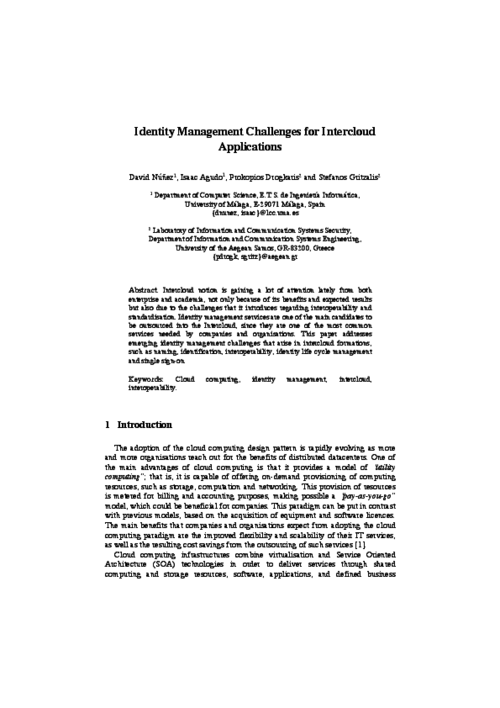
IEEE CloudCom 2011, IEEE Computer Society, pp. 527-531, Nov-Dec 2011. DOI
Abstract
During the last decade, the Cloud Computing paradigm has emerged as a panacea for many problems in traditional IT infrastructures. Much has been said about the potential of Cloud Computing in the Smart Grid context, but unfortunately it is still relegated to a second layer when it comes to critical systems. Although the advantages of outsourcing those kind of applications to the cloud is clear, data confidentiality and operational privacy stand as mayor drawbacks. In this paper, we try to give some hints on which security mechanisms and more specific, which cryptographic schemes, will help a better integration of Smart Grids and Clouds. We propose the use of Virtual SCADA in the Cloud (VS-Cloud) as a mean to improve reliability and efficiency whilst maintaining the same protection level as in traditional SCADA architectures.
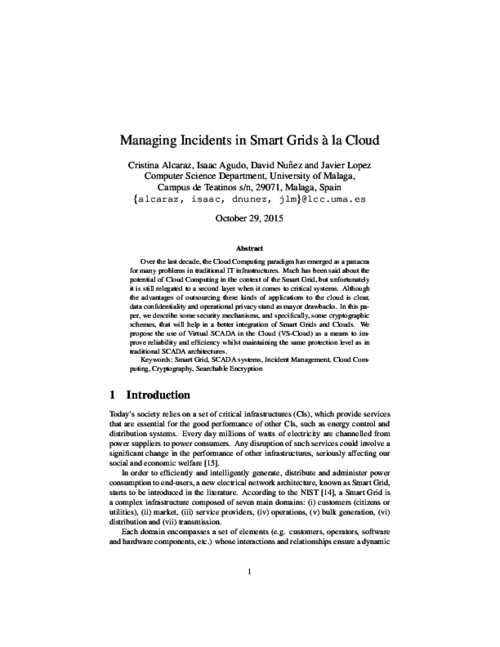
 ]
]